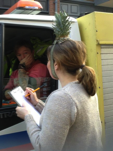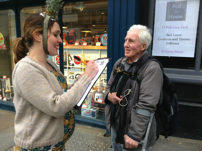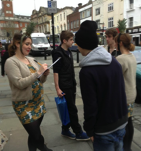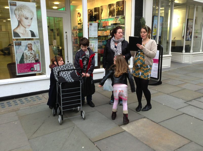An introduction from Maddy Costa: This piece is unlike anything else that has been published on this blog, but then its writer, Simon Bowes, isn’t really like anyone else I know either. I first met him at a Devoted & Disgruntled event: taking place each year in January, it’s a big get-together for theatre-makers of all backgrounds, experiences and disciplines, in which we share concerns and thoughts and reinvigorate ourselves in conversation. At that particular D&D, Simon was talking about time, and in particular, the way in which his work and temperament pull away from the conventional expectations of time that govern the theatre industry – the expectation that work will take a certain period of time to make, that it will be performed for a certain span of time, that makers will follow a linear progression from one work to the next. What if he thought in decades, not years; what if each work wasn’t a single entity but a small part of a whole? That desire to trace his own path, work at his own pace, disavow convention, appealed to me; I decided then that he would be someone whose work I would follow for the rest of my life.
This piece came about after another conversation the two of us had, on email, about time. Something I’ve been thinking a lot about while working on NTiYN is that there are no quick fixes to the questions of audience engagement: this work requires long-term dedication, and a different sense of value. Getting 1000 people to come to the theatre looks impressive, but what’s the point if it’s once and never again? For me it’s better to accumulate audience members by ones and twos, take them on a slower journey, give them real attention, and build lasting relationships. But that can be difficult, emotionally: there are times when it feels as though nothing is changing, times when you’re forced to recognise that the work isn’t a job you can finish neatly and move on, times when all you feel is a pervading sense of failure. Simon is someone who recognises that emotional difficulty. And so I asked him to write for this blog about time. This is what he wrote.
Incidentally, there is a terrific and informal companion piece to this writing on Simon’s blog, triggered by him seeing a double bill of works about time by Deborah Pearson. Both make me really excited about the work Simon is beginning to make as part of a new collaboration, Ding & Sich.
By Simon Bowes
this is about enchantment. i once had to ask what the word meant and the man who i asked told me ( without making me feel small for not knowing ) : to put into song . it’s about dis – enchantment , and re – enchantment , too : singing , wanting to sing , not wanting to sing , and wanting to sing again
i.
s ,
i never told you – never told anyone – how i felt – how lost i felt – sitting in the audience of your perfor-mance . i never told you because i was sure that the fault , or the lack , was mine – that i was not yet ready to accept what it was that you had to give . i remember you stood tall , despondent , naked , asking the way when no-one could tell you the way . the performance , of course , concerned being lost . we are often lost in the theatre and sometimes we do not find our way back to where we were , some of the roads we arrived by – in the short time of the performance – quickly erode . but years have passed – years, years [1] – and often when i think of what i have hoped for – in going to the theatre – i think back to your show
ii.
many things that i see in the theatre i did not – and still do not – understand . it is not always – in fact it is rarely – a case of not understanding , until the artist makes their meaning explicit , or until somebody else paraphrases it , or until you draw a certain set of conclusions afterwards , or until you read an incisive review . sometimes what is said is something unsayable . sometimes what is said may be at once plain and like no speech in any tongue
iii.
a ,
beginning to work together at a certain – necessary – distance , over an indefinite period of time – learning what the circumstances are , i thought i would begin with a familiar story , one that i always keep coming back to :
the first was a hare . at two thousand meters on a mountain frontier … it was a lean hare with tufts on the tips of its ears of brown smoke . and although it was running slowly it was running for its life . sometimes that can happen [2]
iv.
s ,
on the night you asked asked me to join the company , i was singing in the bar . i started with a hymn , idumea , but i remember what it felt like to sing , feet stamping , reddening hands , keeping time against the fullness of my throat :
and am i born to die
to lay this body down
and must my trembling spirit fly
into a world unknown [3]
v.
a night at the theatre may not give you what you expected , what you wanted , it might insist that your expectations, your wants, were unimportant , and sometimes you might be persuaded . it all takes discipline . i’ve learned that i don’t have enough of it and , chances are , neither do you . much of the theatre i’ve seen ( and , yes , everything that i’ve made myself , by one measure or another ) hasn’t had one tenth – sometimes a hundredth – of the discipline
vi.
s ,
like a nail that i repeatedly snag my clothing on , still a smoker , sometimes a maker :
a cigarette is a breathing space . it makes a parenthesis . the time of a cigarette is a parenthesis , and if it is shared you are both in that parenthesis . it’s like a proscenium arch for a dialogue [4]
vii.
the playwright and academic sarah grochala recently wrote about a critical mass of theatre that fails to impress , suggesting three elements that make a show stand out :
the first is an engaging narrative . the kind of narrative that keeps you on the edge of your seat because you’re genuinely not sure where it’s going to go next . i should add here that by narrative i mean something much broader than what people often mean when they talk about narrative
the second element is an engaging form . a form that illuminates the con-tent . that either fits the content like a glove or stands in a productively dis-cordant relationship to it , or a form that takes a form that you are familiar with and twists it in a new way
finally , i’m looking for craft and skill . i want to be inspired by the execution of the performance . i want to see a performance in which all the creatives involved are working at the top of their game and performing artistic miracles . this doesn’t necessarily mean that the production has to have ‘high’ production values in the conventional sense ( … ) plays or performances that fulfil these criteria have what i would call ‘thickness’ , a sense of depth . they take their audiences on satisfying mental and emotional journeys to somewhere they didn’t expect [5]
viii.
s ,
we’d come out of rehearsals – or , finally , after the show – and we’d lean up against a wall to smoke , but you’d never say anything . later i came to appreciate these moments of silence
ix.
i stopped performing , stopped writing , stopped going to the theatre , just about . to return as a member of the audience took its own kind of discipline . i write this from within what i hope is at least the middle of a fallow period – i had to declare that to myself first and i am not ashamed to declare it here . but this spring i started turning up again . the one theatre i go to the most had put together a very enviable sea-son – it showed some exceptional work , and on one occasion , work where the form was unlike anything i had seen before
x.
narrative ( however broadly we might apply the term ) , or the relation between content and form , or craft , or thickness all count. what also counts is a deepening acknowledgement that what a theatrical event asks of us – at once by invitation and demand – is openness , and vulnerability . even when all of the expectations are met and surpassed – in terms of form and craft – the theatre can be a place of rigorous uncertainty . in a recent interview between comedian and podcaster marc maron and the playwright annie baker , much of this is distilled :
baker : i feel like being in a play or putting on a play is like the most humiliating vulnerable thing to do and- maron : musicals ! baker : that’s – that is – but there is something like that’s also really when it works and you’re in the audience and these people are being so vulnerable- maron : right ! baker : and you can get like a high off of it- maron : well not just a high but it’s like it’s-it’s – vulnerability – and- and- in a space where it’s permitted and allowed to be connected with by an audience or others is sort of an elevation of the human spirit it’s sort of why we’re here in some weird way it’s a part of being human that gets very distant from a lot of people ( … ) baker : a play is an opportunity to be in a room with a lot of people and talk about important things or like things that matter to people- maron : but that’s – but that’s – baker : and get really vulnerable with each other [6]
xi.
much of my work so far has tried to explore theatre in relation to time , because i think that time spent at the theatre often doesn’t – and need’t – feel like time spent anywhere else . whether what unfolds in the theatre is a familiar story , or whether it feels that a new and distinct language is forming , time in the theatre can feel denser , or lighter , than anywhere else . at the theatre , we are – or ought perhaps to consider ourselves – in training – we are training ourselves to speak and listen and to look with ever more acute sensitivity . the time designated under the name ‘ performance ’ is only a rehearsal for the next one , and the next one , and the next one . sometimes what we learn in this most contrived of circumstances might apply elsewhere . we ought’nt perhaps to expect it to , but sometimes it does
xii.
the maron / baker interview continues :
baker : here’s all this worry in the theatre community about like is theatre dead ? y’kno- maron : always baker : -w and people have been talking about this stu- maron : yeah baker : -ff for like seventy years maron : right ! baker : uh so i just think it’s funny that people keep thinking that theatre’s dead and no-one’s gonna go see theatre anymore but i feel like people react to that by trying to make stuff that’s like mo-ore entertaining and mo-ore fast moving and like mo-ore glitzy and for me i feel like the thing theatre do-es– you can like slow time down and we can all be in the room together maron : just to tell you i did not feel that either play was long- baker : o-oh that’s grea- maron : at all i don’know why- must be w-why you’re good- baker ; -t [7]
we can use the theatre as a place to retrain our our gaze and our consciousness . individual and collective time can take flight , or come to a pause , with a certain sense of a reckoning .
xiii.
a ,
the gig was in the car park of an industrial estate , i’d’ve preferred a small room . it was my first perfor-mance in a year . i sang three songs , green and yeller , to the pines , passing away . audience horse-shoed around me , i sang for no-one other than you
xiv.
s ,
was it your last performance . i don’t know anymore what you do , for a living , or how you live . i do not know whether you intend ever to perform again . perhaps the theatre does not matter to you as much as once it did . perhaps you have lost all interest . sometimes that can happen . perhaps you are only in a fallow time . i just wanted to tell you i remember it – the title of your last performance – knowing the title is enough : nothing but the living and the longing [8]
xv.
a ,
it has been ten years since we first met , and i’m thinking now about the time it will take to make some-thing – anything – worthwhile . i’m thinking of a small room , not a theatre as such , a studio perhaps , but there certainly is a stage . when i think of myself – or of you – onstage , that person – i , or you – whether s/he leaps clear or flails , s/he runs as the hare runs
xvi.
nothing but the living and the longing
nothing but failure and heartache
nothing but grace but grace nothing but grace
nothing but the living and the longing
nothing but the pleasure and joy
nothing but luck but luck nothing but luck
nothing but the living and the longing [9]
notes:
[1] years, years : deer park (2004)
[2] and our faces , my heart , brief as photos : berger, j (1984) p.4 , london, bloomsbury paperbacks
[3] idumea: words , charles wesley ( 1763 ) ; tune , ananias davisson ( 1816 )
[4] a radical returns : berger , j , in o’hagan, s ( 2005 )
[5] theatre of the unimpressed : groschala, s ( 2015 )
[6] wtf episode 645 – annie baker ( 2015 )
[7] ibid .
[8] nothing but the living and the longing : hauser (2009)
[9] ibid .

































































